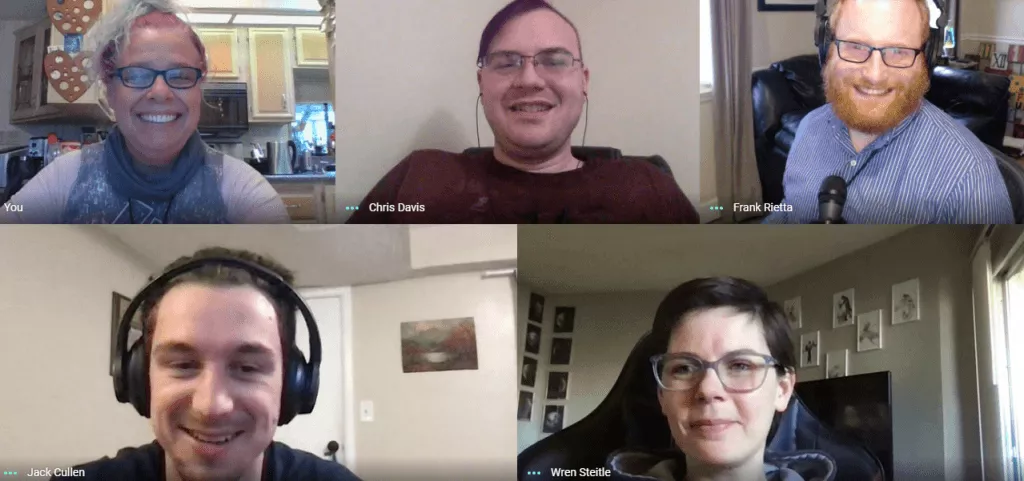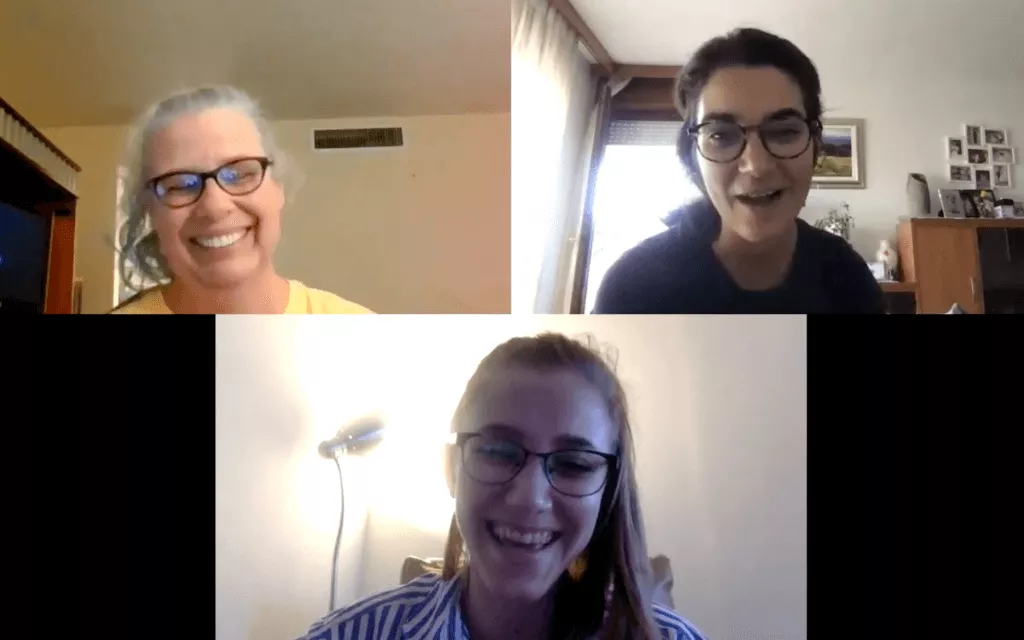Rietta Leads Its Distributed Team With Productive

Rietta is an app development and cybersecurity team based in the US. Like most developers, they exist to deliver high-quality code, but with a focus on security. Their work mainly consists of security audits, new project build-outs, and existing projects adopted for maintenance and future work.
Rietta has been using Productive for over three years. We spoke with Lore Hamilton, Program and Scrum Manager at Rietta to learn how they make the most of our tool.
Can you tell us about Rietta’s history, give us some background? What markets do you operate in, what industries do you serve?
Rietta is a cybersecurity and Ruby software development agency, with a focus on security. As a language, Ruby is something that we focus on in particular as well. We do software development, maintenance, security audits, expert witness testimony, and ad hoc software development. We have clients in the government, real estate, non-profit, and medical sectors. Our goal is to help SMBs get the kind of security they need for their applications at a price they can afford.
Would you say that these clients are long-term or short?
It can be anything from a few hours to many years!
Achieve Your Agency’s True Potential
Switch from multiple tools and spreadsheets to one scalable agency management system.
We Help Your Agency Reach New Heights
Switch from multiple tools and spreadsheets to one scalable agency management system.
Can you tell us a bit about your experience with other project management tools?
We switched from Harvest to Productive. Because of the type of agency we are, Harvest didn’t suit the workflow that we needed for remote development, ad hoc work, tracking (not just time). We have to send detailed reports to our government clients on every time entry as to what was done and who authorized it. In the past, we were struggling with delivering invoices on time. This was a big issue, since most of our projects are billed monthly, and invoicing on time directly impacts our cash flow.
Related: 11 Best Harvest Alternatives
Tell us about your role and what it looks like in Productive.
I’m Rietta’s Program Manager. I’m responsible for all of your standard administrative functions. I set up the budgets, contracts, sales, all the internal stuff, work assignments. I’m basically the only one who uses Productive end-to-end.
I use it daily to review time entries, to check the status of invoices through our integration with Quickbooks. I’m constantly updating the invoice statuses and bill payments. I do weekly reports out to our clients or internally. We try to do radiators, which are basically weekly status reports.
So you’re the project manager for all your projects?
Project manager, business analyst, scrum master, program manager, therapist…
“The ability to provide feedback and actually get results in what you need is pretty amazing compared to pretty much any software I’ve ever used. You guys are more responsive than anyone, ever. And I’ve been doing this for 35 years!“
What was adapting to the tool like? You came in and started using Productive right away?
There was a very little learning curve. Read the menu options and all the pages. It’s pretty self-explanatory. Big “new” buttons, big “add” buttons. As a business analyst and someone who’s done a lot of front-end work in software designing, you guys are doing a great job.
Whenever I see something that I’m a nitpicker about, I just put in a little chat to Krešimir from Sales and he’ll email me back and go “Can you give me more detail on that?”. I do, and you guys are just on top of that. The ability to provide feedback and actually get results in what you need is pretty amazing compared to pretty much any software I’ve ever used. You guys are more responsive than anyone, ever. And I’ve been doing this for 35 years!
Then you can actually appreciate how the software works. It’s not common at all in this industry to work with someone with so much experience!
When I was in 9th or 10th grade and I saw my first computer, it was love at first sight.

I know you said you have a lot of different types of projects and different industries. Have you seen things working through projects—greater profitability or utilization? Did you create a type of template that you see has worked?
One of the things that I love is when I go to the Budgets page and I see all those totals at the top. That’s kind of my daily “where are we with things?” It gives me the ability to go back to my guys and say “Hey, we’ve got only 20% budget left”. So yes, I absolutely watch the numbers.
Another thing I love about the Budgets page is every month, when I go to do our monthly invoicing, I love the fact that first, it tells me that I have recurring budgets to check and deliver. So I can go through and do all of that. The invoice column lets me easily skim through and use it as a checklist when invoicing.
Utilization, cost rates, calculated hourly profit rates… We look at all of that. We’re a people-first company and everyone gets a lot of freedom. That’s what makes Productive even more valuable for us. I go in every morning and check unapproved time entries.
So you’re a one-woman-band in terms of using Productive, from sales to invoicing. Is there any feature that you could single out as your favorite?
Recently I’m really enjoying the time entry and approval updates. The process of creating an invoice is great. It’s a vast improvement between copying things between windows.
You mention invoicing a lot. Did you have struggles with invoicing before? Wearing so many different hats, does Productive help you to not forget to invoice?
Yes, absolutely. Because I am doing many different things, invoicing needs to be quick and easy. Between the recurring templates that I use and standard line item options, doing the invoicing for 30-40 clients every month takes me a couple of hours tops. It’s just so easy, especially with the Quickbooks integration.
One of our key strengths is profitability tracking. How important is that for you, how often do you look at profitability insights? Does it influence your decisions?
Yes, normally at least three times a week we talk about where we are with each project. It has driven a line of business decisions. For example, our maintenance work brings us passive income, it keeps our cash flow flowing. Before, it wasn’t really like that. Over the past year, I’ve worked with Frank, our CEO to show him our hourly effective rates. It’s given us the ability to zero in on what’s working for the business and what’s not working for the business.
“Because a similar proposal might have said “this is going to take us 100 hours”, but the reality might have been 60 or 160. That reality is what is going to drive the proposal for the new proposal or the lack of even trying for that business.“
So let’s say a new opportunity comes in. How do you decide if you’re going to work with them or not?
Well, one of the things we do is we go back into Productive and take a look at similar projects that we’ve done before. A similar proposal from the past might have said “this is going to take us 100 hours”, but the reality might have been 60 or 160 hours. That reality is what’s going to drive the new proposal or the lack of even trying for that business. So if the utilization for that project was 160% and we know we can’t get 160% of the price for the project again for the next client, then there’s no reason to step into that deal. But if the utilization was 60%, and we had a 40% profit margin—then we’re like yeah, let’s do that!
Going back to asking for more details on time entries: before, asking for detailed time tracking wasn’t being enforced as well, and being able to do all the things I can do with time entries now gives me the ability to: a) enforce the time entry, b) get more details, c) have a better understanding of where we’re spending time and money on a given project and whether it’s worth doing those kinds of projects again. Also, I get to see whether I’m assigning the right person for the task.
So, if I had three projects that were similar and I had three different people work on them, and person A did it at 60%, and person B did it at 80%, and person C did it at 160%—I’m going for person A. But that’s ok, because person C may be way better at something else. At Rietta, people work on the things that they’re good at and enjoy. Sometimes they don’t recognize it themselves, so I’m here to help with that.

In general, a lot of employees don’t like time tracking. What’s your experience with it?
Well, because we’re an agency, it’s not an option. I did actually have someone who came in and said they don’t want to track their time. You definitely get those kinds of people, but this argument about time tracking is really new, in my experience.
Achieve Your Agency’s True Potential
Switch from multiple tools and spreadsheets to one scalable agency management system.


